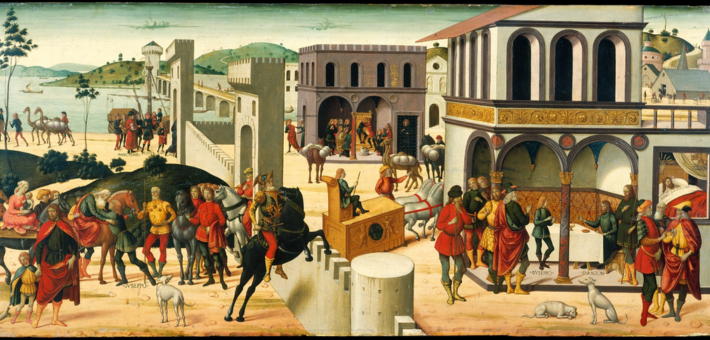Commentary on Genesis 37:3-8, 17b-22, 26-34; 50:15-21
The story of Joseph begins in Genesis 37 and ends in Genesis 50. At 14 chapters, it is the longest continuous narrative in Genesis, occupying roughly a quarter of the whole book. It traces a complex arc: a movement from adolescence to maturity, hubris to responsibility, and fraternal rivalry to reconciliation.
It starts with Joseph as a 17-year-old boy who dreams dreams of supremacy—stalks and stars bowing down to him—and ends with a 37-year-old man (41:46–57) whose interpretation of dreams saves a nation. In the beginning, Joseph is braggadocious and naive, whereas at the conclusion, he deliberately hides himself from his brothers (42:7). At first they hate him and sell him into slavery. But at the finale, after rising to power at Pharaoh’s right hand, he tells them, “Even though you intended to do harm to me, God intended it for good” (50:20a; compare 45:7–8). Instead of enmity, there is mutual embrace (45:15a).
The Joseph story is preached in a variety of ways. Many preachers discern in Joseph’s example a type of Christ. The thematic resonances are easy enough to identify. An innocent sufferer brings about reconciliation through his faithfulness. He passes successfully through temptation. From social death—imprisonment and forgottenness—God raises him to an exalted, powerful, and life-giving position.
Or again: many preachers generalize Joseph’s consoling words to his brothers at the end of the book. His claim builds into a whole doctrine of providence. Just as God draws life and good out of Joseph’s brothers’ intention to do harm, so also does God draw life and good out of our experiences of evil. Joseph becomes a case study of Romans 8:28, “All things work together for good for those who love God, who are called according to his purpose.”
But the task of preaching the Joseph story can also look to intertexts that are canonically nearer to it. Before reaching all the way over into the other testament and pulling in Christ’s suffering, temptation, death, and resurrection, we might sooner search the book of Genesis for clues about the significance of Joseph. Before linking Joseph and the apostle Paul, we might listen for theological “melodies” in the more immediate literary contexts.
Indeed, from this capstone story of Genesis we expect callbacks, refrains, and resolutions relative to the rest of the book. Beginnings and endings are places where biblical writings do a lot of their hermeneutical heavy lifting, and this appears true of Genesis too. So, for example, the scholar Matthew Schlimm considers the relationship between the Cain-and-Abel story in Genesis 4 and the Joseph story at the close of Genesis. “As Cain’s disastrous life unfolds, readers long for one who will serve as an anti-Cain, fulfilling the role of being a keeper for his brothers, providing security and sustenance for family members in a harsh world.”1 This brothers’ keeper is exactly what Joseph then embodies. Instead of retaliation, he offers forgiveness.
But another chapter at a further concentric distance from the Joseph story forms just as powerful a framing for preaching Joseph. Genesis 1 truly begins the book. It sets forth a vision of humans made in the image of God and deputized to exercise rule on God’s behalf (1:26–28). Humans enjoy a certain primacy, even supremacy, in relation to other creatures. They are, as it were, God’s stand-ins or vice-regents. But if human “dominion” is patterned on God’s own dominion exemplified in this chapter, then it is meant to tend and preserve life—since that is what God pursues—making a home for each being and ensuring they have food to eat.
The Joseph story at the end of Genesis corresponds to this template. Joseph dreams of supremacy, and then he achieves it. He is quite literally a vice-regent. The story reminds us repeatedly that he is second only to Pharaoh (Genesis 41:37–45; 44:18; 45:8). His finger carries Pharaoh’s own signet ring (41:42).
More than that: Joseph understands his calling in terms of preserving life. He says to his brothers: “Do not be distressed or angry with yourselves because you sold me here, for God sent me before you to preserve life” (45:5). And that is what Joseph does: he saves all of Egypt, saves livestock and animals, saves his family. He ensures that all have food to eat. Brent Strawn writes: “Joseph may [therefore] be a final and remarkably successful instance of the imago [Dei, or image of God].”2
For preaching the Joseph story, his imaging of God holds out a promise: God will find representatives. God will work, even in hidden ways, through God’s agents and deputies in order to preserve life. The process of making such agents fit for service may be long and indirect. Joseph faced deep hardships, false starts, doldrums. But the Lord was with him, and he remained open, apparently, to God’s initiative, even when it came obliquely through his fellow prisoners or the dreams of a foreign ruler.
God’s representatives are not perfect. Even a remarkably successful example of imaging God is still marked by sin. Joseph’s vice-regency saved lives—but it also bought up nearly all Egyptian land, imposed a heavy tax, and virtually enslaved the populace (Genesis 47). In these regards, Joseph anticipates rulers from later in Israel’s scriptures. Solomon called up work gangs and put them to hard labor (1 Kings 5:13; see also 9:15-22 and 12:4). Pharaoh Neco imposed a heavy tax on Judah (2 Kings 23:33). Nebuchadnezzar seized lands (2 Kings 24:7). Joseph acts as a prelude to the unnamed Pharaoh of Exodus 1.
Still, this makes the promise of the Joseph story stand out all the more: God will promote life, even secretly and circuitously, even if God’s agents fall into pharaonic habits. We have this treasure in earthen vessels (2 Corinthians 4:7).
Notes
- Matthew Schlimm, From Fratricide to Forgiveness: The Language and Ethics of Anger in Genesis, Siphrut 7 (Winona Lake: Eisenbrauns, 2011), 142.
- Brent A. Strawn, “From Imago to Imagines: The Image(s) of God in Genesis,” in The Incomparable God: Readings in Biblical Theology, ed. Collin Cornell and M. Justin Walker (Grand Rapids: Eerdmans, 2023), 8.
PRAYER OF THE DAY
God of dreams and hope,
You spoke to Joseph in his dreams, and those dreams led him to great danger. Yet you used the challenges in his life to save the lives of others. In you, no good thing is accidental. You work in us and through us, even when we are not aware of your presence. Help us to know that you are with us, and that only you are capable
of turning all evil to good. We pray all these things in the name of Jesus Christ, our Redeemer. Amen.
HYMNS
Forgive our sins as we forgive ELW 605, H82 674, UMH 390
Have no fear, little flock ELW 764
Lord of glory, you have bought us ELW 707
CHORAL
Parce domine, Feliks Nowowiejski (cpdl.org)


September 22, 2024